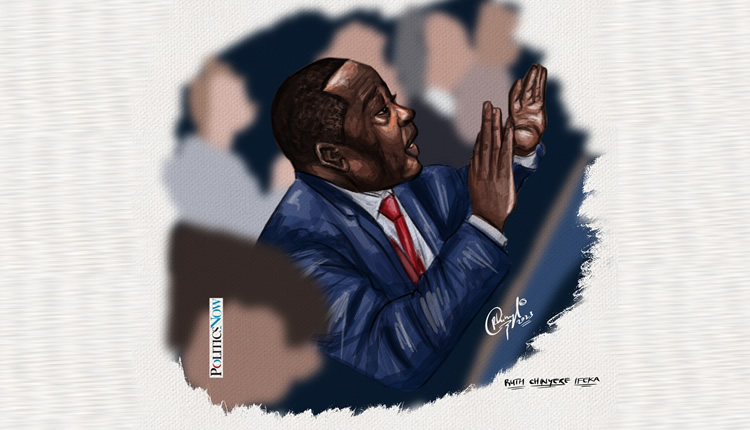Sometime in April 2017, Simon Ateba attended a press conference called by a non-governmental organization to draw attention to the heartless demolition of a slum community by agents of the Lagos State government. Ateba, a Cameroonian by birth, and Nigerian by residence at the time, was practising journalism in Africa’s most populous city, Lagos.
The briefing was held in a small conference room of a hotel in the Alausa area of Ikeja, in Lagos State. The attendance comprised about 30 people, including journalists, three prominent human rights lawyers in Lagos, and the conveners. The lawyers were; Liborous Oshomah, Uche Onu and Ikechukwu Ikeji, now deceased.
Dressed in highly polished suits, the lawyers looked different from the journalists in the room who were mostly dressed in flying shirts and trousers, or native attire.
After the condemnations of the demolition and legal threats made against the Lagos State Government by the lawyers, Ateba waved his hand for attention. He was promptly recognized to speak. At this point, everything changed.
He started off praising the suits of the lawyers and asked if any of them had visited the site of the tragedy – Otodo Gbame, where hundreds of families were displaced. He said what the community needed at this point were not hopeful speeches but immediate financial assistance.
At this point, the convener of the press conference, Victoria Ibezim-Ohaeri, who is the executive director of Spaces for Change, intervened, telling Ateba that we all help in different ways, and there was no need underplaying the effort of others. Ateba left the meeting looking disappointed.
Curious about who this hard-hitter was, I googled Ateba using the name he provided during the introductions. It turns out he was the owner of a blog, simonateba.com, now known as Today News Africa.
An image of him also propped during the Google search where he was in a rickety boat with the Norwegian Ambassador, Jens Petter, ostensibly heading to the scene of the demolition. Jen Petter had strongly pleaded against the demolition of Otodo Gbame. All that is now history.
Ateba has since moved to the United States to pursue his journalism career in a country reputed for free speech.
Upon arrival, he set up his online newspaper office in Washington DC, applied for accreditation to cover African affairs in the White House and got one.
Not long in the White House, the Cameroonian-born journalist suddenly became the centre of major discourse following an incident with White House Press Secretary, Karine Jean-Pierre. It turns out that because Ateba does not work for some big networks or newspapers, Karine Jean-Pierre would not give him the chance to ask questions, despite several efforts, including emails and face-to-face meetings in her office.
On March 20, 2023, Ateba protested against Karine Jean-Pierre during a Press Conference that included the cast of the comedy series Ted Lasso. Ateba said Jean-Pierre had discriminated against him by not calling on him during her seven-month tenure as White House Press Secretary.
The protest immediately caught the attention of Americans who either praised or lashed him, depending on where one stands in that country’s political fray. Those on the right said his action was heroic. Those on the left called him ‘combative,’ even though the same people cheered CNN’s Jim Acosta for sparring with then U.S. President, Donald Trump during a similar briefing.
On Twitter, Ateba rose from a couple of thousand followers to nearly half a million followers after the incident with Karine Jean Pierre.
More telling is that all the big platforms have either written about him or aired his exchange with Karine Jean-Pierre. The New York Times’ recent article about Ateba is titled: “Why Won’t Simon Ateba Stop Shouting?”
After he was banned from the White House briefing room, Bloomberg wrote about Ateba: “The White House appears to have revoked credentials for 400 reporters to bar just one. That wasn’t necessary.”
Ateba was born in Cameroon in 1979 or 1980, according to his profile on Wikipedia.
He moved to Nigeria, where he worked at P.M. News and for nine years at The NEWS magazine.
Ateba appeared in the documentary “Nigeria’s Millionaire Preachers” about religion becoming a big business in Nigeria in 2011. By then, he had investigated the link between religion and money in Nigeria for about five years and had been beaten up at least once during those investigations. He was attacked by a mob in 2009 while working on an assignment at a church in Lagos.
On August 28, 2015, Ateba was arrested by Cameroonian authorities and accused of spying for Boko Haram as he investigated the living conditions of Nigerian refugees camped in the country’s north. Ateba was based in Lagos and had travelled to Cameroon after receiving a grant from the International Centre for Investigative Reporting in Abuja to investigate the ordeals and suffering of Nigerians who had fled to Cameroon following Boko Haram attacks on their communities. He was released after being detained for four days. Ateba’s arrest and detention were condemned by the Cameroon Journalism Trade Union.
Ateba moved to Washington, D.C. in 2017 to report on Africa–United States relations, which he told The New York Times was motivated by an interest in the subject and the desire to leave West Africa due to the dangers he experienced working as a journalist.










More Stories
Why Burkina Faso’s Ibrahim Traore has captured hearts and minds around the world
Oby Ezekwesili: The fighter for social justice, women rights
#EndBadGovernanceInNigeria protest: The roar of hungry Nigerians